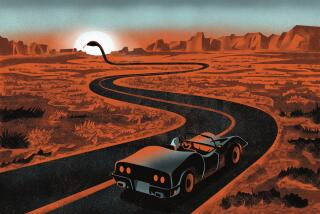Cannes 2013: How did James Franco come to adapt a Faulkner book to screen?
CANNES, France--Even by the standards of 20th-century postmodernists, William Faulkner is considered a difficult, if not unfilmable, moviemaking challenge. His sentences can be fractured, his action can be interior and his points-of-view often splatter in 10 different directions.
So of course James Franco thought this was good movie material.
The prolific star turned out to the Cannes Film Festival last week to premiere his newest movie, an adaptation of Faulkner’s “As I Lay Dying” that he wrote, directed and stars in. The film stays more or less faithful to Faulkner’s narrative premise of the Bundren’s family quest to bury their matriarch, while mixing in some cinematic tricks to capture Faulkner’s style (e.g., split screens early in the drama). The movie, which will head to U.S. theaters in the fall, elicited respectful if not overly exuberant reviews at the festival.
PHOTOS: Cannes Film Festival 2013
In an interview at the festival, Franco said he had a longstanding love of Faulkner ever since he read “As I Lay Dying” more than a decade ago. And his experience making an inherently difficult movie about the poet Hart Crane -- “we wanted it to be obtuse because the poetry is obtuse,” he said of his movie “The Broken Tower” -- showed him that even the master from Mississippi was a possibility.
But it took an unlikely secondhand encounter with an activist celebrity to seal the deal.
“When I did “Milk’ I read an oral autobiography of Sean Penn, and in it someone was talking about how he once tried to do ‘As I Lay Dying,’” Franco said. “And the fact that he even thought about doing it said to me ‘Oh. It’s not an impossibility.’” Franco and his producers set out to acquire the book’s film rights, a process that took several years because those rights were tied up in several places.
But legal maneuvering was only the beginning. The big challenge lay with making an abstract novel visual. Franco said he looked to several places to pull it off.
CHEAT SHEET: Cannes Film Festival 2013
“There was a key to the movie that came from the book,” he said. “Faulkner works on multiple levels, and on one level I saw this as a really simple story: a road movie about a family and the obstacles they face.”
And the other level, the one with shifts in perspective and other unconventional devices?
“[Director Robert] Altman had talked about that because he’s a man who used multiple characters and complex structures,” Franco said. “And he said as long as he has a through line like a road movie, he can hang very complex concepts and approaches on it. So I thought ‘Great. I’ll do that.’”
ALSO:
Cannes 2013: James Gray returns to the festival
Cannes 2013: J.C. Chandor’s “All is Lost’ is unusual survival tale
Cannes 2013: For ‘Nebraska’s’ Bruce Dern redemption in geezerhood
Follow me on Twitter at https://twitter.com/ZeitchikLAT
PHOTOS AND MORE
VIDEO: Upcoming summer films
ENVELOPE: The latest awards buzz
PHOTOS: Greatest box office flops
More to Read
From the Oscars to the Emmys.
Get the Envelope newsletter for exclusive awards season coverage, behind-the-scenes stories from the Envelope podcast and columnist Glenn Whipp’s must-read analysis.
You may occasionally receive promotional content from the Los Angeles Times.







